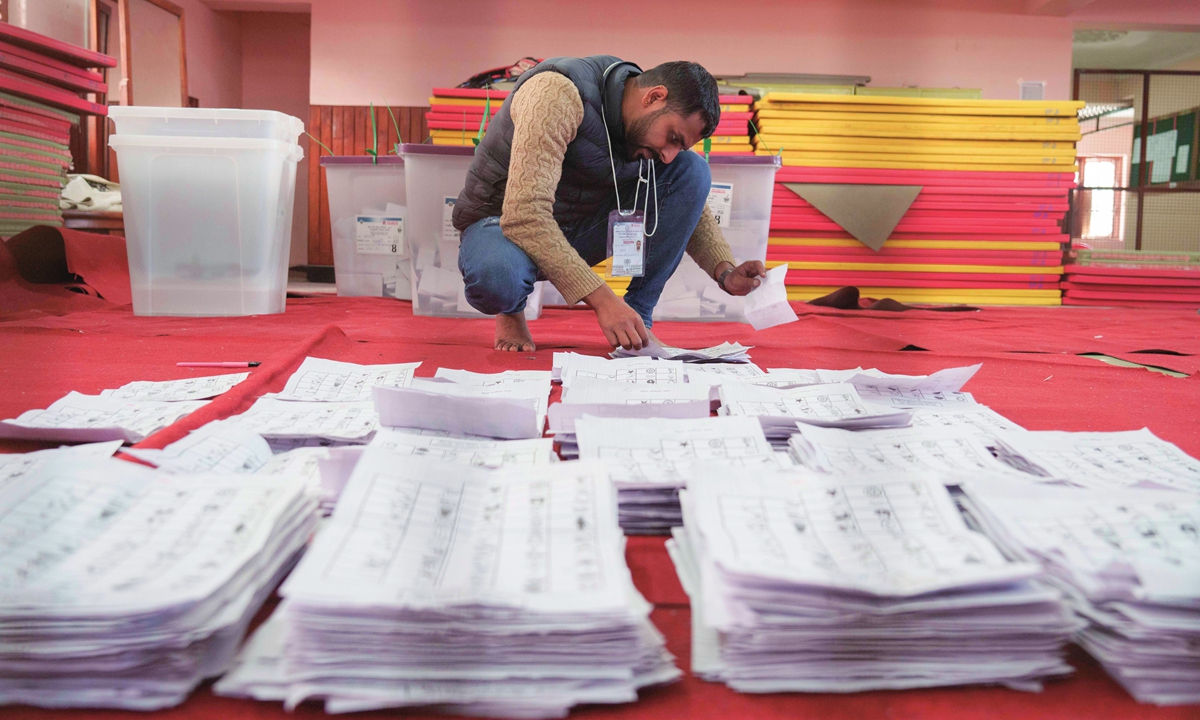
An election commission staffer separates ballots ready for tallying a day after the general election in Kathmandu, Nepal, on November 21, 2022. Photo: VCG
The elections for the House of Representatives of the federal parliament and seven provincial assemblies concluded in Nepal on November 20. Though official results are yet to be released, Nepali observers said that Nepal's friendly relations with China will not be affected.
Initial election results showed the ruling Nepali Congress party was in the lead on November 23 and could emerge as the single largest winner, said analysts who expect a hung parliament to give new political parties a decisive role in forming the government, Reuters reported.
As the conventional parties control the overwhelming number of seats, there is no possibility of a major shift in Nepal-China bilateral relations, Balmukunda Regmi, a professor at Tribhuvan University, told the Global Times.
"The major question now lies on the government formation. It is not immediately clear how the power sharing deal will be done. No matter which parties form the government, Nepal is likely to continue trying to maintain good relationships with both the neighbors India and China. The Nepali Congress party has mentioned the same in its election manifesto as well," said Shristi Kafle, a Kathmandu-based independent journalist.
Experts say that Nepal should strengthen exchanges with China, advance high-quality Belt and Road Initiative (BRI) cooperation in investment, infrastructure, and other areas, and jointly build the Trans-Himalayan Multi-Dimensional Connectivity Network to bring tangible benefits to the people of both countries.
Chairman of National Assembly of Nepal Ganesh Prasad Timilsina reaffirmed the Nepali parliament's active support of the BRI construction and is willing to learn from China's experience in economic and social development as well as in poverty alleviation.
In a previous interview with the Global Times in September, Nepali Ambassador to China Bishnu Pukar Shrestha said that they are working on finalizing the implementation plan for BRI cooperation which will pave the way for further enhanced cooperation such as a selection of projects and modalities of financing.
But Nepali observers warned that key BRI projects have progressed slowly, partly because some rumors of the so-called debt trap diplomacy has impacted certain decision makers in Nepal.
Shrestha slammed the accusation by some media outlets that the railway project will drag Nepal into a "debt trap." He said that he did not see any matter of "debt trap," since no discussions of loans or debts have been part of the China-Nepal railway project.
Nepal has long adhered to an independent or non-aligned foreign policy based on Panchasheel, or the Five Principles of Peaceful Coexistence, said Kafle. "All the political parties have pledged to balanced relations. When it comes to China, Nepal has independently handled its friendship by maintaining sovereignty, integrity, and independence. It carries a similar essence with the CPC's principle of respecting sovereignty."
Basically, there will be no difference in Nepal's ties with China no matter which party leads the new government because all parties have expressed their commitment to the one-China principle, and are boosting bilateral relations with China, Ritu Raj Subedi, deputy executive editor of the Kathmandu-based media The Rising Nepal, told the Global Times.
Subedi hopes that the CPC can expand its relations with all parties in Nepal for the building of closer interaction and a positive image in Nepal.




